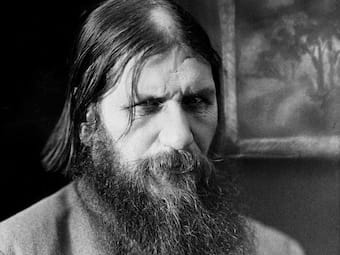An aerial view of the City of Oxford. Peter and other members of his embassy studied England’s cities, including Oxford and Manchester, looking for ideas for the building of St Petersburg in Russia. In essentials, Oxford has not changed all that much since 1698; following industrialisation, Manchester would be barely unrecognisable to Peter.
IT was not all work for the visiting Tsar. Peter also toured London’s sights, including the Tower and Westminster Abbey, and watched Thomas Betterton’s staging of John Fletcher’s ‘The Prophetess’, to music by Purcell.* He was quite smitten with Letitia Cross in John Vanbrugh’s play ‘The Relapse’ at Drury Lane,** but was disappointed to be turned away from an exotic Venetian-style gambling entertainment in the Strand, because the police were raiding the venue.
The Tsar had his portrait painted by Sir Godfrey Kneller, discussed Christianity with the Bishop of Salisbury through an interpreter, and talked astronomy with Edmund Halley in German. King William visited him twice, though Peter’s pet monkey made the second occasion rather uncomfortable by employing His Majesty as a kind of gymnastic apparatus.
The Tsar left on April 21st, having learnt much but failed to secure his anti-Ottoman alliance. John Evelyn returned to Sayes Court to find it in utter chaos, which cost £133 2s 6d to repair. He billed the Government.
‘The Prophetess: or, The History of Dioclesian’ (1690) was a musical version of an earlier play, dating from 1622, by John Fletcher and Philip Massinger. The semi-operatic revival was staged by Thomas Betterton with music by Henry Purcell (1659-1695), and choreographed by Josias Priest.
** ‘The Relapse, or, Virtue in Danger’ was premiered in 1696: Letitia played Miss Hoyden. John Vanbrugh (1664-1726) was both a dramatist and an architect, the designer of Blenheim Palace, Castle Howard and Seaton Delaval Hall. He played a key part in bringing King William III to England in 1688, and spent five years in the Bastille for his pains.
Précis
During his four months in England, Tsar Peter the Great was introduced to notable British figures in the church and the sciences, and was entertained at the opera and theatre. He gained useful information on military and architectural matters, but left in April 1698 without English support for his dispute with the Ottoman Turks. (54 / 60 words)
During his four months in England, Tsar Peter the Great was introduced to notable British figures in the church and the sciences, and was entertained at the opera and theatre. He gained useful information on military and architectural matters, but left in April 1698 without English support for his dispute with the Ottoman Turks.
Variations: 1.increase the length of this precis to exactly 60 words. 2.reduce the length of this precis to exactly 50 words. 3.introduce one of the following words into the precis: about, because, if, may, must, or, whereas, whether.
Archive
Word Games
Sevens Based on this passage
Suggest answers to this question. See if you can limit one answer to exactly seven words.
Variations: 1.expand your answer to exactly fourteen words. 2.expand your answer further, to exactly twenty-one words. 3.include one of the following words in your answer: if, but, despite, because, (al)though, unless.
Jigsaws Based on this passage
Express the ideas below in a single sentence, using different words as much as possible. Do not be satisfied with the first answer you think of; think of several, and choose the best.
Spinners Find in Think and Speak
For each group of words, compose a sentence that uses all three. You can use any form of the word: for example, cat → cats, go → went, or quick → quickly, though neigh → neighbour is stretching it a bit.
This exercise uses words found in the accompanying passage.
1 Although. John. Prophetess.
2 Design. Raid. Spend.
3 Discuss. Tour. Urban.
Variations: 1. include direct and indirect speech 2. include one or more of these words: although, because, despite, either/or, if, unless, until, when, whether, which, who 3. use negatives (not, isn’t, neither/nor, never, nobody etc.)
Add Vowels Find in Think and Speak
Make words by adding vowels to each group of consonants below. You may add as many vowels as you like before, between or after the consonants, but you may not add any consonants or change the order of those you have been given. See if you can beat our target of common words.
bd (11+4)
abide. abode. bad. bade. bead. bed. bid. bide. bode. booed. bud.
abed. baaed. bod. ibid.
Post Box : Help Available
You are welcome to share your creativity with me, or ask for help with any of the exercises on Clay Lane. Write to me at this address:
See more at Post Box.
If you like what I’m doing here on Clay Lane, from time to time you could buy me a coffee.
Buy Me a Coffee is a crowdfunding website, used by over a million people. It is designed to help content creators like me make a living from their work. ‘Buy Me a Coffee’ prides itself on its security, and there is no need to register.
Related Posts
Peter the Great wanted Russia to join the nations of Western Europe, but the nations of Western Europe refused to make room for him.
Picture: By Nikolai Florianovitch Dobrovolskiy (1837-1900), via Wikimedia Commons. Licence: Public domain.. Source.
Posted June 22 2022
Despite failing health, Peter the Great of Russia leapt into Kronstadt Bay to save some young sailors from a watery grave.
Picture: By Ivan Ayvazovsky (1817–1900), via Wikimedia Commons. Licence: Public domain.. Source.
Posted June 13 2022
Gregory Rasputin is tricked into attending a dissolute Moscow soirée, and shares his sadness with Englishman Gerard Shelley.
Picture: Via the Imperial War Museums collection, and Wikimedia Commons. Licence: Public domain.. Source.
Posted February 1 2020
Picture: © Konstantin-hramov, Wikimedia Commons. Licence: CC BY-SA 4.0.. Source.
Posted August 21 2016






